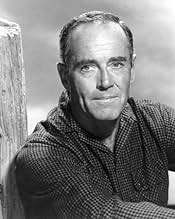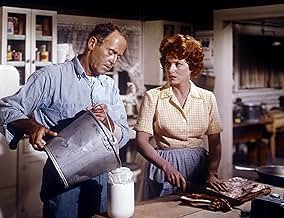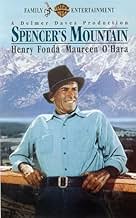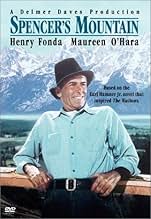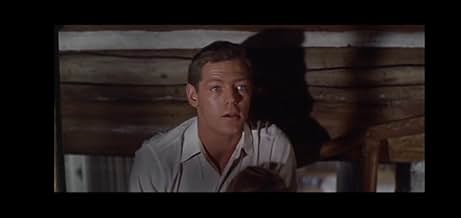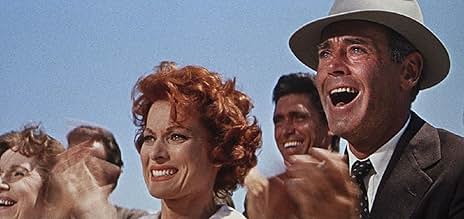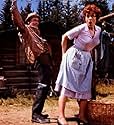IMDb RATING
7.0/10
3.3K
YOUR RATING
Grand Teton quarryman and family patriarch carefully navigates issues of religion and education in order to eke out a brighter future for his family.Grand Teton quarryman and family patriarch carefully navigates issues of religion and education in order to eke out a brighter future for his family.Grand Teton quarryman and family patriarch carefully navigates issues of religion and education in order to eke out a brighter future for his family.
- Awards
- 1 nomination total
William Breen
- Mountain Boy
- (uncredited)
Veronica Cartwright
- Becky Spencer
- (uncredited)
Michele Daves
- Donnie Spencer
- (uncredited)
Martin Eric
- Odell Harper
- (uncredited)
- Director
- Writers
- All cast & crew
- Production, box office & more at IMDbPro
Storyline
Did you know
- TriviaIn their book "How Underdog Was Born...", W. Watts Biggers and Chad Strover reveal that seeing Wally Cox's performance in this movie inspired them to ask him to voice their newly created character, Underdog.
- GoofsWhen Clay Spencer is driving to the university he's in what looks like a 1955 Ford F100 truck. When he arrives at the school he's driving a 1956 Ford F100. Then when he gets back to the library he's again driving the older model Ford truck.
- Quotes
Miss Parker: The world steps aside to let any man pass if he knows where he is going.
- SoundtracksAmerica the Beautiful
(uncredited)
Words by Katharine Lee Bates 1904
Music by Samuel A. Ward, 1882
Sung by Barbara McNair
Featured review
Adapted from the autobiographical novel by Earl Hamner, Jr., "Spencer's Mountain" is, firstly, a nostalgic look at a way of life from the viewpoint of the writer. Released in 1963, the story undoubtedly had great appeal for those who see that way of life as quintessentially "the American way".
Set in New Dominion, the name is the first clue to the outlook of the residents (and the film's producers). "Dominion" might be translated as a territory under God's authority or control. Religion is one of the subjects of the film. But life in New Dominion has a simplicity that is a central theme.
In this valley that nestles under the Grand Tetons, there are only two churches. There are also few choices of occupation, few neighbors, and few visitors. Residents are connected to the land in an elemental way--mostly through farming, quarrying or via the lumber mill. One unstated but permeating message of the film is the goodness and value associated with such a connection.
The central character is Clay Spencer (Henry Fonda), father of eight and salt of the earth. Living under sparkling blue skies, he and his wife, Olivia (Maureen O'Hara), raise their children to be kind and to have dreams. Another central theme of the film is the value of dreams. The family is dedicated to the purpose of sending the oldest child, Clayboy (James MacArthur), to college.
One of their long-term projects is a dream house set on an idyllic hillside overlooking the valley and the grandeur of the mountains.
As Clay and his family strive for their dreams and negotiate the hardships that intervene in all lives, the viewer is treated to vignettes that are dipped in Disney and Doris Day. Bountiful streams and pastures bursting with fecundity frame a Norman Rockwellian world even homier and more basic than Mayberry. The film has been accused of mawkishness and justifiably so. No chance is missed to sing a hymn, recognize a milepost of life, wave the American flag or jerk a tear from a moment.
But that is not all bad. The film does what it does very well. Henry Fonda's voice almost feels like the bedrock that supports the entire family. The rosy-cheeked cast is the perfect picture of God's grace. The end product feels very iconic and touching, no doubt extracting tears from numerous scenes. I wish the sentimentality had been dialed down a notch--like when "America" is unnecessarily played behind the toasting of Clayboy.
"Spencer's Mountain" was well-designed for audiences in 1963. Even with it's overly sentimental tone, it has a wholesomeness and a respect for values that will appeal to viewers of any era.
Later, the story would be adapted again as TV's "The Waltons".
Set in New Dominion, the name is the first clue to the outlook of the residents (and the film's producers). "Dominion" might be translated as a territory under God's authority or control. Religion is one of the subjects of the film. But life in New Dominion has a simplicity that is a central theme.
In this valley that nestles under the Grand Tetons, there are only two churches. There are also few choices of occupation, few neighbors, and few visitors. Residents are connected to the land in an elemental way--mostly through farming, quarrying or via the lumber mill. One unstated but permeating message of the film is the goodness and value associated with such a connection.
The central character is Clay Spencer (Henry Fonda), father of eight and salt of the earth. Living under sparkling blue skies, he and his wife, Olivia (Maureen O'Hara), raise their children to be kind and to have dreams. Another central theme of the film is the value of dreams. The family is dedicated to the purpose of sending the oldest child, Clayboy (James MacArthur), to college.
One of their long-term projects is a dream house set on an idyllic hillside overlooking the valley and the grandeur of the mountains.
As Clay and his family strive for their dreams and negotiate the hardships that intervene in all lives, the viewer is treated to vignettes that are dipped in Disney and Doris Day. Bountiful streams and pastures bursting with fecundity frame a Norman Rockwellian world even homier and more basic than Mayberry. The film has been accused of mawkishness and justifiably so. No chance is missed to sing a hymn, recognize a milepost of life, wave the American flag or jerk a tear from a moment.
But that is not all bad. The film does what it does very well. Henry Fonda's voice almost feels like the bedrock that supports the entire family. The rosy-cheeked cast is the perfect picture of God's grace. The end product feels very iconic and touching, no doubt extracting tears from numerous scenes. I wish the sentimentality had been dialed down a notch--like when "America" is unnecessarily played behind the toasting of Clayboy.
"Spencer's Mountain" was well-designed for audiences in 1963. Even with it's overly sentimental tone, it has a wholesomeness and a respect for values that will appeal to viewers of any era.
Later, the story would be adapted again as TV's "The Waltons".
- How long is Spencer's Mountain?Powered by Alexa
Details
- Runtime1 hour 58 minutes
- Sound mix
- Aspect ratio
- 2.35 : 1
Contribute to this page
Suggest an edit or add missing content



